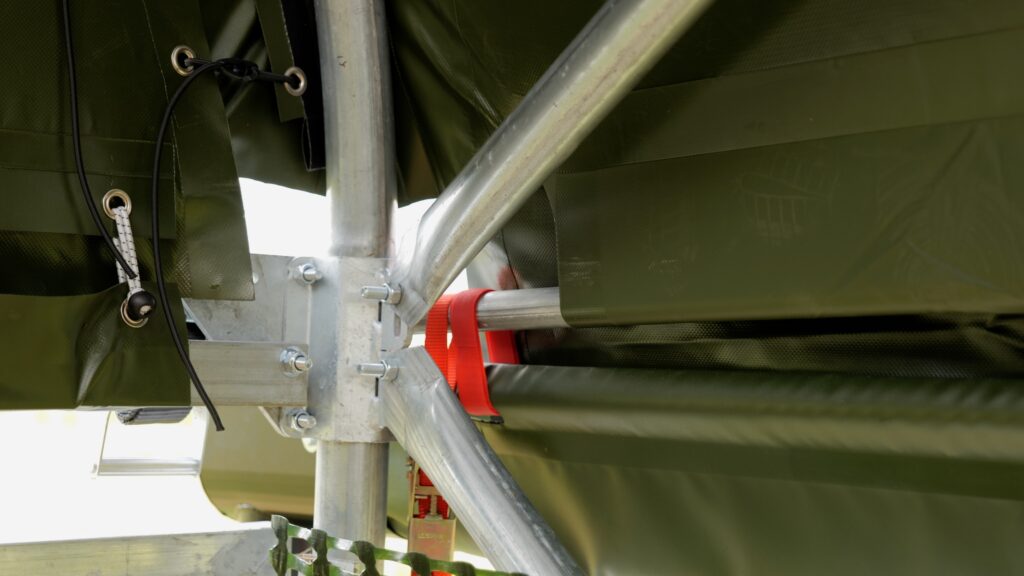In the dynamic world of industrial operations and large-scale projects, the need for versatile, robust, and quickly deployable structures is paramount. Outdoor canopy frames, particularly those designed to span between ISO shipping containers, have emerged as a game-changing structure for creating adaptable workspaces and storage areas.
These innovative structures offer a perfect blend of durability, flexibility, and rapid deployment, making them an invaluable asset for a wide range of industrial applications. Here, we’ll explore how these canopy frames are revolutionising the approach to temporary workshops and large-scale storage requirements, providing unparalleled benefits that can significantly enhance operational efficiency and project success.
Rapid deployment and flexibility: Transforming industrial spaces
One of the most significant advantages of outdoor canopy frames in industrial projects is their ability to be rapidly deployed and reconfigured. Traditional construction methods often involve lengthy build times and substantial labour costs. In contrast, these canopy frames can be erected in a fraction of the time, with structures like the McGregor Shield Canopy being installed in as little as two days. This rapid deployment capability is crucial for industries where time is of the essence and operational continuity is vital.
The flexibility of these canopy frames extends beyond their quick installation. These structures can be easily expanded, reduced, or reconfigured to meet changing project needs. For instance, a manufacturing facility might require different covered areas as production demands fluctuate. With canopy frames, facility managers can swiftly adapt their sheltered spaces without significant disruption to ongoing operations.
Moreover, the modular nature of many outdoor canopy frame systems allows for creative options for complex spatial challenges. Multiple units can be joined together in a multi-bay setup, creating expansive covered areas for large machinery or extensive inventory storage. This level of flexibility is invaluable in diverse scenarios, from creating temporary vehicle maintenance workshops to setting up long-term industrial storage facilities.
Enhanced weather protection and operational continuity
Large-scale industrial projects and storage operations are often vulnerable to weather conditions, which can significantly impact productivity and asset protection. These canopy frames provide a robust option to this perennial challenge, offering superior protection against the elements. These structures are engineered to withstand diverse weather conditions, from heavy rain and strong winds to intense sunlight, ensuring that work can continue uninterrupted regardless of external conditions.
The weather protection offered by canopy frames translates directly into operational continuity – a critical factor in industrial settings. In workshop scenarios, for example, maintenance and repair work can continue under the shelter of these canopies even during inclement weather. This ability to maintain productivity regardless of external conditions can significantly reduce project delays and associated costs.
Plus, the protection provided by the canopy frames extends to equipment and materials. In large-scale industrial projects, safeguarding valuable machinery and supplies from weather damage is crucial. These canopies create dry, covered spaces that serve as effective workshops or storage areas, ensuring that sensitive equipment and materials remain in optimal condition throughout their use or storage period.
The versatility of outdoor canopy frames also allows for comfortable working environments in various climates. In hot regions, these structures can be designed to provide shade and improve air circulation, creating more tolerable working conditions. In colder or wetter climates, they can be outfitted with additional features to offer more comprehensive protection, ensuring year-round usability.
Cost-effectiveness and adaptability in industrial operations
When it comes to large-scale industrial projects, budget considerations are always at the forefront. Canopy frames offer a cost-effective alternative to permanent buildings, providing substantial savings in both the short and long term. The initial investment in these structures is often lower than that of permanent constructions, particularly when considering the speed of installation and reduced labour costs.
The reusability of outdoor canopy frames is a key factor in their cost-effectiveness. Unlike permanent structures tied to a specific location, these canopies can be disassembled and relocated to different sites as needed. This portability means that a single investment can serve multiple projects or locations over time, maximising the return on investment for industrial operations.
Adaptability is another crucial benefit of these canopy frames in industrial settings. These structures can be quickly and easily modified to complement changing needs. For example, a canopy initially set up for storage can be quickly repurposed into a workshop area by adding appropriate lighting and equipment. This flexibility allows businesses to respond rapidly to changing operational requirements without extensive construction work.
Additionally, the modular nature of many outdoor canopy systems allows for easy expansion. As a business grows or project requirements change, additional units can be seamlessly integrated with existing structures. This scalability ensures that the investment in canopy frames continues to meet the evolving needs of the operation, providing a future-proof structure for industrial space requirements.

Embracing innovative structures for industrial spaces
Outdoor canopy frames represent a significant advancement in managing large-scale industrial projects and storage needs. Their rapid deployment capabilities, flexibility, weather protection, and cost-effectiveness make them an indispensable tool for operations managers across various industries. From creating temporary workshops for vehicle maintenance to providing expansive, weather-protected storage areas, these structures offer alternative options to many of the challenges inherent in managing extensive industrial operations.
By embracing the advantages of these canopy frames, project managers and industrial operators can enhance operational efficiency, reduce costs, and improve overall project outcomes. As we look to the future of large-scale industrial project management, it’s clear that these versatile structures will continue to be a key component in the toolkit of successful operational leaders.
